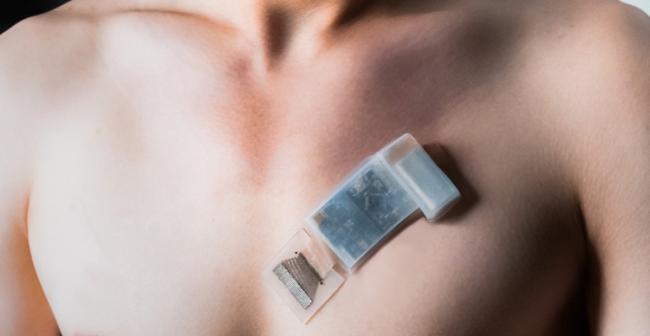New wearable ultrasound system can monitor BP, heart function on the go

New York, May 29 (IANS) US engineers have developed the first fully integrated wearable ultrasound system that can monitor blood pressure, heart functions while in motion and also transmit data wirelessly.
The system developed by engineers at the University of California San Diego facilitates potentially life-saving cardiovascular monitoring.
All previous soft ultrasonic sensors required tethering cables for data and power transmission, which largely constrains the user's mobility.
But the new fully integrated autonomous wearable ultrasonic system-on-patch (USoP) includes a small, flexible control circuit that communicates with an ultrasound transducer array to collect and transmit data wirelessly.
A machine learning component helps interpret the data and track subjects in motion.
The ultrasonic system-on-patch, detailed in the journal Nature Biotechnology, allows continuous tracking of physiological signals from tissues as deep as 164 mm, continuously measuring central blood pressure, heart rate, cardiac output, and other physiological signals for up to 12 hours at a time.
The sensor can evaluate cardiovascular function in motion. Abnormal values of blood pressure and cardiac output, at rest or during exercise, are hallmarks of heart failure.
For healthy populations, the device can measure cardiovascular responses to exercise in real time and thus provide insights into the actual workout intensity exerted by each person, which can guide the formulation of personalised training plans, the researchers said.
"This project gives a complete solution to wearable ultrasound technology -- not only the wearable sensor, but also the control electronics are made in wearable form factors," said Muyang Lin, doctoral student in the Department of Nanoengineering at UC San Diego.
"We made a truly wearable device that can sense deep tissue vital signs wirelessly.
"This technology has lots of potential to save and improve lives," Lin said.
The USoP also represents a breakthrough in the development of the Internet of Medical Things (IoMT), a term for a network of medical devices connected to the Internet, wirelessly transmitting physiological signals into the cloud for computing, analysis and professional diagnosis.
The engineers took devices that were stationary and portable and made them stretchable and wearable, driving a transformation across the landscape of healthcare monitoring.
Disclaimer: This story has not been edited by the Sakshi Post team and is auto-generated from syndicated feed.




